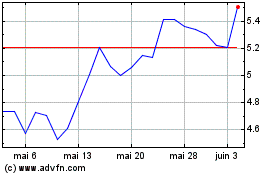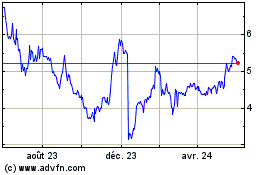Achieve Life Sciences President and CMO, Dr. Cindy Jacobs, Speaks at FDA and NIH Smoking Cessation Public Meeting
23 Octobre 2024 - 2:00PM

Achieve Life Sciences, Inc. (Nasdaq: ACHV), a late-stage
pharmaceutical company dedicated to the global development and
commercialization of cytisinicline for the treatment of nicotine
dependence, announced that Dr. Cindy Jacobs, Achieve’s President
and Chief Medical Officer, presented at the U.S. Food and Drug
Administration (FDA) and the National Institutes of Health (NIH)
Joint Public Meeting on “Advancing Smoking Cessation: FDA and NIH
Priorities” held on October 21, 2024.
The public meeting was initiated by Robert Califf, M.D., who
currently serves as the 25th Commissioner of the FDA. The meeting
included other representatives from the FDA, the NIH, the National
Institute on Drug Abuse, and key academic and industry
organizations with the stated focus of the meeting on accelerating
innovation to advance treatments for smoking cessation.
“We are appreciative that the FDA and NIH are making an effort
to bring together experts who share a common goal of reducing the
number of lives lost every year due to smoking-related diseases,”
stated Dr. Jacobs. “It has been nearly two decades since a new
prescription smoking cessation treatment has been approved by the
FDA. Cytisinicline is currently the only nicotine dependence
treatment in late-stage development. We have completed two
randomized Phase 3 clinical trials in over 1,600 subjects
demonstrating robust evidence supporting safety and efficacy, based
on the gold-standard clinical endpoint of continuous smoking
cessation. We are currently working to complete a longer-term
safety exposure study in subjects and look forward to our continued
engagement with the FDA as we move towards our NDA filing and
potential approval.”
Dr Jacobs was one of 10 participants at the meeting selected to
deliver a 4-minute presentation. In her presentation Dr. Jacobs
reminded the attendees that cytisine has been a smoking cessation
treatment for decades in Eastern and Central Europe. She also
pointed out that although the efficacy and safety profile has been
well-established for this older marketed product, the treatment
involves a complex 25-day titration regimen. Dr. Jacobs highlighted
Achieve’s redevelopment of this drug into a novel treatment for
nicotine addiction, now known as cytisinicline. This new
cytisinicline product features a revised formulation and tablet
strength, easier streamlined dosing schedule, and extended
treatment durations, demonstrating strong efficacy and excellent
safety in the completed Phase 3 trials. In closing, Dr. Jacobs
urged the FDA to re-assess how new drugs are being approved for
smoking cessation treatment, especially given that no new
prescription medications have been approved in nearly two decades,
versus how other new nicotine or tobacco products are being
approved in the US.
Full comments from the public meeting have been submitted to the
public docket and are available at
www.regulations.gov/document/FDA-2024-N-4085-0001.
About Achieve and Cytisinicline Achieve’s
focus is to address the global smoking health and nicotine
addiction epidemic through the development and commercialization of
cytisinicline. There are approximately 29 million adults and 2.25
million middle and high school students in the United States alone
who smoke combustible cigarettes.1,2 Tobacco use is currently the
leading cause of preventable death that is responsible for more
than eight million deaths worldwide and nearly half a million
deaths in the United States annually.3,4 More than 87% of lung
cancer deaths, 61% of all pulmonary disease deaths, and 32% of all
deaths from coronary heart disease are attributable to smoking and
exposure to secondhand smoke.3
In addition, there are over 11 million adults in the United
States who use e-cigarettes, also known as vaping.5 In 2024,
approximately 1.6 million middle and high school students in the
United States reported using e-cigarettes.6 Currently, there are no
FDA-approved treatments indicated specifically as an aid to
nicotine e-cigarette cessation.
Cytisinicline is a plant-based alkaloid with a high binding
affinity to the nicotinic acetylcholine receptor. It is believed to
aid in treating nicotine addiction for smoking and e-cigarette
cessation by interacting with nicotine receptors in the brain,
reducing the severity of nicotine craving symptoms, and reducing
the reward and satisfaction associated with nicotine products.
Cytisinicline is an investigational product candidate being
developed for the treatment of nicotine addiction and has not been
approved by the Food and Drug Administration for any indication in
the United States.
Forward Looking StatementsThis press release
contains forward-looking statements within the meaning of the “safe
harbor” provisions of the Private Securities Litigation Reform Act
of 1995, including, but not limited to, statements regarding the
timing and nature of cytisinicline clinical development and
regulatory review and approval, data results and commercialization
activities, the potential market size for cytisinicline, the
potential benefits, efficacy, safety and tolerability of
cytisinicline, the ability to discover and develop new uses for
cytisinicline, including but not limited to as an e-cigarette
cessation product, the development and effectiveness of new
treatments, and the successful commercialization of cytisinicline.
All statements other than statements of historical fact are
statements that could be deemed forward-looking statements. Achieve
may not actually achieve its plans or product development goals in
a timely manner, if at all, or otherwise carry out its intentions
or meet its expectations or projections disclosed in these
forward-looking statements. These statements are based on
management’s current expectations and beliefs and are subject to a
number of risks, uncertainties and assumptions that could cause
actual results to differ materially from those described in the
forward-looking statements, including, among others, the risk that
cytisinicline may not demonstrate the hypothesized or expected
benefits; the risk that Achieve may not be able to obtain
additional financing to fund the development and commercialization
of cytisinicline; the risk that cytisinicline will not receive
regulatory approval or be successfully commercialized; the risk
that new developments in the smoking cessation landscape require
changes in business strategy or clinical development plans; the
risk that Achieve’s intellectual property may not be adequately
protected; general business and economic conditions; risks related
to the impact on our business of macroeconomic and geopolitical
conditions, including inflation, volatile interest rates,
volatility in the debt and equity markets, actual or perceived
instability in the global banking system, global health crises and
pandemics and geopolitical conflict and the other factors described
in the risk factors set forth in Achieve’s filings with the
Securities and Exchange Commission from time to time, including
Achieve’s Annual Reports on Form 10-K and Quarterly Reports on Form
10-Q. Achieve undertakes no obligation to update the
forward-looking statements contained herein or to reflect events or
circumstances occurring after the date hereof, other than as may be
required by applicable.
Investor Relations ContactRich
Cockrellachv@cg.capital(404) 736-3838
Media ContactGlenn
SilverGlenn.Silver@Finnpartners.com(646) 871-8485
References 1VanFrank B, Malarcher A,
Cornelius ME, Schecter A, Jamal A, Tynan M. Adult Smoking Cessation
— United States, 2022. MMWR Morb Mortal Wkly Rep
2024;73:633–641. 2Jamal A, Park-Lee E, Birdsey J, et al.
Tobacco Product Use Among Middle and High School Students —
National Youth Tobacco Survey, United States, 2024. MMWR Morb
Mortal Wkly Rep 2024;73:917–9243World Health Organization. WHO
Report on the Global Tobacco Epidemic, 2019. Geneva: World Health
Organization, 2017. 4U.S. Department of Health and Human
Services. The Health Consequences of Smoking – 50 Years of
Progress. A Report of the Surgeon General, 2014. 5Cornelius
ME, Loretan CG, Jamal A, et al. Tobacco Product Use Among Adults –
United States, 2021. MMWR Morb Mortal Wkly Rep
2023;72:475–483. 6Park-Lee E, Jamal A, Cowan H, et
al. Notes from the Field: E-Cigarette and Nicotine Pouch
Use Among Middle and High School Students — United States, 2024.
MMWR Morb Mortal Wkly Rep 2024;73:774–778.
Achieve Life Sciences (NASDAQ:ACHV)
Graphique Historique de l'Action
De Nov 2024 à Déc 2024

Achieve Life Sciences (NASDAQ:ACHV)
Graphique Historique de l'Action
De Déc 2023 à Déc 2024
